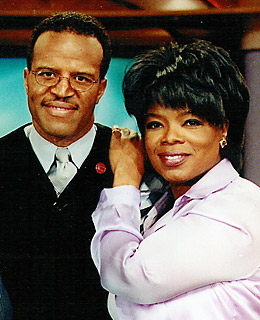
John Hope Bryant and Oprah Winfrey
John Hope Bryant was certain that the verdict in the Rodney King police beating trial would be guilty. With videotaped evidence, there was no way the rule of law would be violated. He turned out to be wrong, of course, but he didn't let the verdict and its aftermath destroy his essential optimism; on the contrary, the riots caused the entrepreneur, who owned a financing and consulting firm, to start an organization focused, literally, on hope for the future.
"I felt fooled because I thought discrimination had been solved and there was justice," he says. "But I'm standing in my office when the verdict came in and at about 4 p.m. I start to see smoke rising from my window view, which was over East L.A."
The first thing Bryant did was go to First A.M.E. church to meet with local and national activists and officials including Gov. Pete Wilson and Rev. Jesse Jackson to figure out what to do with the rage brewing in the community. But it was too late to contain all that rage, and within a few days, much of Los Angeles had been ravaged, leaving the people who lived in those neighborhoods to rebuild.
After seeking advice from his mentor, Rev. Cecil Murray, Bryant sought out as many bankers, investors and members of the media as possible to drum up interest in rebuilding South Central Los Angeles.
Bryant called the organization Operation Hope, whose purpose was to connect the community to private sector opportunities. He virtually went door-to-door attempting to help arrange financing for people whose businesses were damaged or destroyed, or wanted to open new businesses. Since then he has raised $400 million and created 1,000 homeowners throughout the areas affected by the riot.
Today, Bryant still runs Operation Hope. He is also an author and lecturer on urban empowerment.
"The charity and handout era is dead," he said. "Racism does exist, but we've got to save our own lives. We have to get over it and get to it, so black and brown America have to speak a language of empowerment."
—Madison Gray